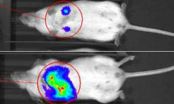(Press-News.org) Researchers at the University of California, San Diego School of Medicine have identified an enzyme that controls the spread of breast cancer. The findings, reported in the current issue of PNAS, offer hope for the leading cause of breast cancer mortality worldwide. An estimated 40,000 women in America will die of breast cancer in 2014, according to the American Cancer Society.
"The take-home message of the study is that we have found a way to target breast cancer metastasis through a pathway regulated by an enzyme," said lead author Xuefeng Wu, PhD, a postdoctoral researcher at UC San Diego.
The enzyme, called UBC13, was found to be present in breast cancer cells at two to three times the levels of normal healthy cells. Although the enzyme's role in regulating normal cell growth and healthy immune system function is well-documented, the study is among the first to show a link to the spread of breast cancer.
Specifically, Wu and colleagues with the UC San Diego Moores Cancer Center found that the enzyme regulates cancer cells' ability to transmit signals that stimulate cell growth and survival by regulating the activity of a protein called p38 which when "knocked down" prevents metastasis. Of clinical note, the researchers said a compound that inhibits the activation of p38 is already being tested for treatment of rheumatoid arthritis.
In their experiments, scientists took human breast cancer cell lines and used a lentivirus to silence the expression of both the UBC13 and p38 proteins. These altered cancer cells were then injected into the mammary tissues of mice. Although the primary tumors grew in these mice, their cancers did not spread.
"Primary tumors are not normally lethal," Wu said. "The real danger is cancer cells that have successfully left the primary site, escaped through the blood vessels and invaded new organs. It may be only a few cells that escape, but they are aggressive. Our study shows we may be able to block these cells and save lives."
Researchers have also defined a metastasis gene signature that can be used to evaluate clinical responses to cancer therapies that target the metastasis pathway.
INFORMATION:
Co-authors include: Weizhou Zhang, UC San Diego and University of Iowa; Joan Font-Burgada,Trenis Palmer, Alexander S. Hamil, Lesley G. Ellies, Jing Yang, Steven F. Dowdy and Michael Karin, UC San Diego; Subhra K. Biswas, Agency for Science, Technology and Research, Singapore; Michael Poidinger, Agency for Science, Technology and Research, Singapore and National University of Singapore; Nicholas Borcherding and Qing Xie, University of Iowa; Nikki K. Lytle, Raymond G. Fox and Tannishtha Reya, UC San Diego and Sanford Consortium for Regenerative Medicine; Li-Wha Wu, UC San Diego and National Cheng Kung University, Taiwan.
Funding for this study was provided, in part, by Susan G. Komen for the Cure, National Institutes of Health (grants CA163798 and AI043477) and Pedal the Cause San Diego.
Enzyme controlling metastasis of breast cancer identified
2014-09-02
ELSE PRESS RELEASES FROM THIS DATE:
Study links sex hormone levels in the blood to risk of sudden cardiac arrest
2014-09-02
LOS ANGELES (Sept. 2, 2014) – Measuring the levels of sex hormones in patients' blood may identify patients likely to suffer a sudden cardiac arrest, a heart rhythm disorder that is fatal in 95 percent of patients.
A new study, published online by the peer-reviewed journal Heart Rhythm, shows that lower levels of testosterone, the predominant male sex hormone, were found in men who had a sudden cardiac arrest. Higher levels of estradiol, the major female sex hormone, were strongly associated with greater chances of having a sudden cardiac arrest in both men and women. ...
UO-Berkeley Lab unveil new nano-sized synthetic scaffolding technique
2014-09-02
EUGENE, Ore. -- Scientists, including University of Oregon chemist Geraldine Richmond, have tapped oil and water to create scaffolds of self-assembling, synthetic proteins called peptoid nanosheets that mimic complex biological mechanisms and processes.
The accomplishment -- detailed this week in a paper placed online ahead of print by the Proceedings of the National Academy of Sciences -- is expected to fuel an alternative design of the two-dimensional peptoid nanosheets that can be used in a broad range of applications. Among them could be improved chemical sensors ...
Microphysiological systems will revolutionize experimental biology and medicine
2014-09-02
The Annual Thematic issue of Experimental Biology and Medicine that appears in September 2014 is devoted to "The biology and medicine of microphysiological systems" and describes the work of scientists participating in the Microphysiological Systems Program directed by the National Center for Advancing Translational Sciences (NCATS) of the National Institutes of Health (NIH) and funded in part by the NIH Common Fund. The Defense Advanced Research Projects Agency (DARPA) and the Food and Drug Administration (FDA) are collaborating with the NIH in the program. Fourteen of ...
An uphill climb for mountain species?
2014-09-02
A recently published paper provides a history of scientific research on mountain ecosystems, looks at the issues threatening wildlife in these systems, and sets an agenda for biodiversity conservation throughout the world's mountain regions.
The paper, "Mountain gloom and mountain glory revisited: A survey of conservation, connectivity, and climate change in mountain regions," appears online in the Journal of Mountain Ecology. Authors are Charles C. Chester of Tufts University, Jodi A. Hilty of the Wildlife Conservation Society, and Lawrence S. Hamilton of World Commission ...
Sabotage as therapy: Aiming lupus antibodies at vulnerable cancer cells
2014-09-02
New Haven, Conn. — Yale Cancer Center researchers may have discovered a new way of harnessing lupus antibodies to sabotage cancer cells made vulnerable by deficient DNA repair.
The findings were published recently in Nature's journal Scientific Reports.
The study, led by James E. Hansen, M.D., assistant professor of therapeutic radiology at Yale School of Medicine, found that cancer cells with deficient DNA repair mechanisms (or the inability to repair their own genetic damage) were significantly more vulnerable to attack by lupus antibodies.
"Patients with lupus ...
Seatbelt laws encourage obese drivers to buckle up
2014-09-02
CHAMPAIGN, Ill. — Obesity is associated with many health risks, including heart disease and diabetes, but University of Illinois researchers have found a possible way to mitigate one often-overlooked risk: not buckling up in the car.
A new study led by Sheldon H. Jacobson, a professor of computer science and of mathematics, found that increasing the obesity rates are associated with a decrease in seatbelt usage. However, these effects can be mitigated when seatbelt laws are in effect.
"Primary seatbelt laws lead to increased use of seatbelts," Jacobson said. "On the ...
Melatonin does not reduce delirium in elderly patients having acute hip surgery
2014-09-02
Melatonin supplements do not appear to lessen delirium in elderly people undergoing surgery for hip fractures, indicates a new trial published in CMAJ (Canadian Medical Association Journal)
Many older patients in hospital experience delirium, with disturbances in their sleep–wake cycle. Antipsychotic medications used to reduce symptoms have serious adverse effects, leading the US Food and Drug Administration to warn against their use. Benzodiazepines are also used, although they are known to cause or aggravate delirium. A lack of melatonin may be one factor underlying ...
Changing microbial dynamics in the wake of the Macondo blowout
2014-09-02
In an article in the September issue of BioScience, Samantha Joye and colleagues describe Gulf of Mexico microbial communities in the aftermath of the 2010 Macondo blowout. The authors describe revealing population-level responses of hydrocarbon-degrading microbes to the unprecedented deepwater oil plume.
The spill provided a unique opportunity to study the responses of indigenous microbial communities to a substantial injection of hydrocarbons. Surveys of genetic identifiers within cells known as ribosomal RNA and analyses relying on modern techniques including metagenomics, ...
Humiliation tops list of mistreatment toward med students
2014-09-02
Each year thousands of students enroll in medical schools across the country. But just how many feel they've been disrespected, publicly humiliated, ridiculed or even harassed by their superiors at some point during their medical education?
Recently, researchers at Michigan State University were the first to analyze 12 years worth of national survey data from the Association of American Medical Colleges, or AAMC, questioning graduating students about their medical school experience during the clinical portion of their education.
They found that up to 20 percent of ...
Early cerebellum injury hinders neural development, possible root of autism
2014-09-02
A brain region largely known for coordinating motor control has a largely overlooked role in childhood development that could reveal information crucial to understanding the onset of autism, according to Princeton University researchers.
The cerebellum — an area located in the lower rear of the brain — is known to process external and internal information such as sensory cues that influence the development of other brain regions, the researchers report in the journal Neuron. Based on a review of existing research, the researchers offer a new theory that an injury to the ...




